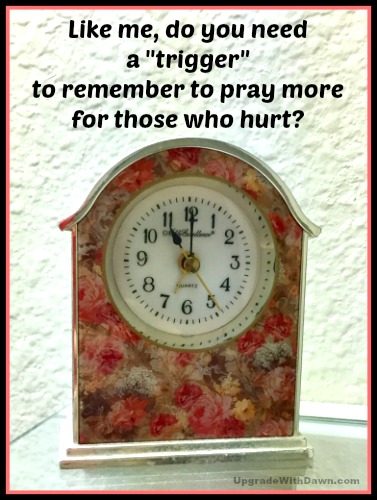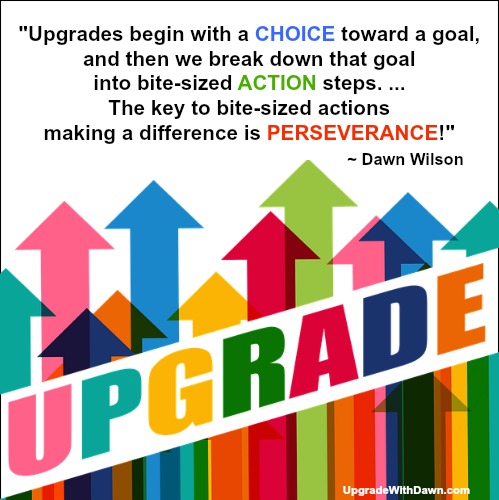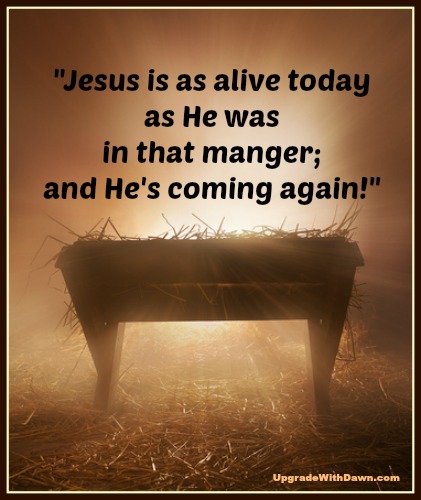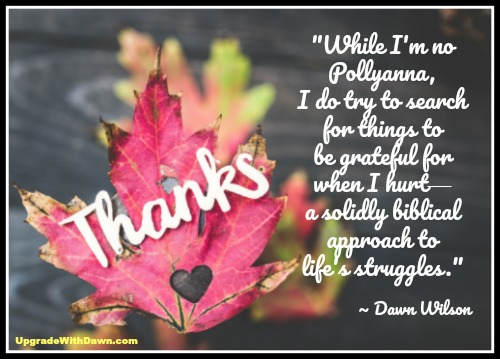Grasping God's Ropes of Hope
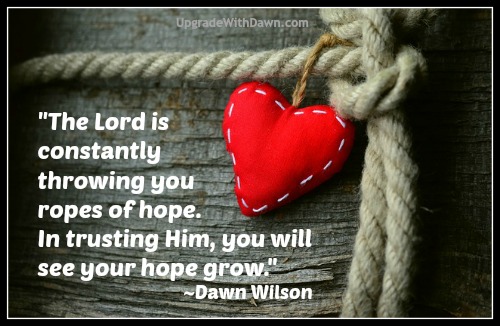 In this Biblical Thinking UPGRADE, Dawn Wilson shares how a medical diagnosis caused her to re-evaluate a familiar biblical word.
In this Biblical Thinking UPGRADE, Dawn Wilson shares how a medical diagnosis caused her to re-evaluate a familiar biblical word.
"As a Christian," Dawn says, "I believe in eternal hope, but the word "hope" was never a word I gravitated to or used much otherwise, because I mistakenly thought it was—I confess—for weak and "emotional" believers.
"Never mind that the word is found repeatedly throughout scripture: 129 times in 121 verses!"
Dawn continues . . .
I want to be honest and authentic here.
A medical diagnosis in mid-January, 2019, totally changed my perspective, perhaps because I was suddenly the one who was weak and needing hope. The doctor said I have an incurable disease, and my thoughts and emotions scattered everywhere.
Oh, how I needed hope in the moment I received that life-changing report.
What I discovered is, first, what "hope" is not, and second, how all hope for the Christian is linked to the surety of hope in Christ throughout our lives as well as in eternity. God cares about us womb to tomb, and He sends us ropes of hope to remind us of His presence every day.
From womb to tomb, God is there!
I discovered many "ropes of hope" God sent my way during my health crisis. Let me share a little of what God is teaching me:
1. What Biblical Hope Is NOT
Hope is not doubt or any shade of doubt. It's not related to a feeling, but rather a reality based on truth.
We show a measure of doubt or uncertainty when we say some doubt-filled things. Things like:
- "I hope it doesn't snow tomorrow." (But it just might.)
- "I hope I win the lottery." (But with the millions who bought tickets, fat chance!)
- "I sure hope I'm going to heaven." (But don't you want to know for sure?)
The Old Testament saints didn't relate to God with "hope so" faith. The Hebrew word for "hope" is batah. It is related to the concept of security and confidence. The concept of doubt was not connected with hope in the Jewish mindset.
We see this in verses like Psalm 16:9:
"Therefore my heart is glad, and my whole being rejoices; my flesh also dwells secure."
In the New Testament, the word for "hope" is the Greek words elpis and elpizo.
For the most part, we don't see doubt running rampant in New Testament saints either. In fact, their proclamations we're more like "There's no doubt about it!"—confident statements of assurance. God worked in their hearts to build their faith and hope.
Even doubting Thomas didn't doubt for long. The Lord changed his doubts to confident faith, the basis for gratitude and hope.
We see this confidence in Hebrews 11:1: "Now faith is being sure of what we HOPE for and certain of what we do not see." Properly read, "The Faith Chapter" (Hebrews 11) oozes with confidence in God in the midst of great trials; it was faith in action.)
And that brings me to a second concept about hope.
2. What Biblical Hope IS
Biblical hope is founded in faith—and in a faithful God.
Biblical hope is the confident expectation or assurance Christ-followers have based upon the One who has proven Himself faithful time and time again. In other words, biblical hope is built on faith (Romans 8:24; Titus 2:13)
It's based on a sure foundation—Jesus, the solid "Rock" of our salvation. Jesus said, "Because I live, you also will live" (John 14:19). Believing that, we have great hope.
When we trust the words, "Most assuredly, I say to you, he who believes in Me has eternal life" (John 6:47), we are expressing confidence in the One who died to set us free from sin's shakles and give us life with Him in heaven.
Biblical hope is founded on:
- God's Word,
- God's character, and
- Our Savior's finished work.
God promised His children "the hope of eternal life" from before time began (Titus 1:2); and Christians are to testify to this living hope whenever anyone asks us about our confidence in God and His provision—the Gospel, God's plan of salvation (1 Peter 3:15).
Grasping Ropes of Hope
I read a great illustration about the difference between faith and hope:
The relationship between faith and hope can be illustrated in the joy a child feels when his father tells him they are going to an amusement part tomorrow. The child believes that he will go to the amusement part, based on his father's word—that is FAITH. At the same time, that belief within the child kindles an irrepressible joy—that is HOPE.
The child's natural trust in his father's promise is the faith; the child's squeals of delight and jumping in place are the expressions of the hope. Faith and hope are complementary. Faith is grounded in the reality of the past [God's faithful word]; hope is looking to the reality of the future....."
The truth is, since 1971, I have believed my Father's Word about eternal life. I staked my whole life now and forever on that truth. I know God has purpose even in my illness.
As Pastor Alan Redpath once said:
"There is nothing, no circumstance, no trouble, no testing that can ever touch me until, first of all, it has come past God and past Christ, right through to me. If it has come that far, it has come with a great purpose."
When I received my medical diagnosis, hope really came into play. Through hope, I have learned to express hope-filled joy—the childlike "squeals of delight"—even in the midst of bothersome side effects and extreme exhaustion. I not only believe God is sustaining me and I have an eternal home with Him; I'm getting more excited about going to heaven.
Pam Farrel wrote about joy in her own difficult situation in her creative devotional study experience: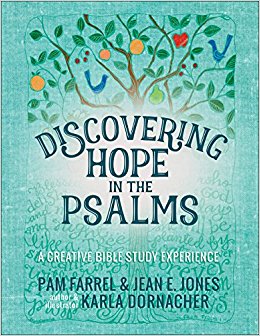 Discovering Hope in the Psalms:
Discovering Hope in the Psalms:
"When friends would ask, 'How are you?' I didn't know how to answer. So I went to the Word and read Psalm 30:5... JOY! That's what I needed. I immediately went on a joy hunt ...
"Joy was becoming my lighthouse of hope. ...
"That's the power of the Word. Its joy is not only your lighthouse; God multiplies the light as you share your hope and praise Him."
These days, I take action quicker when I feel overwhelmed:
1. God wants me to be tough.
So when Satan schemes and tells me lies about the future, I stay in the fight and remind him where he's going! And I remind him of God's words. In doing so, I gain FRESHLY-INSTILLED hope.
2. God wants me to stay thankful.
So when compassionate friends write or call to tell me they are praying for me, and share words of scripture, I am grateful; and as I praise God for them bolstering my faith, I see FRIEND-SHARED hope grow.
3. God wants me to embrace truth.
So when tears come because I cannot bear the thought of someday leaving those I love, FAITH-BASED hope reminds me I will see all my Christ-trusting friends and family throughout eternity.
In other words, I sow solid biblical fortitude, heart gratitude and powerful truths among my tears—and they blossom into many beautiful things.
I am grateful I'm not alone in this hope journey.
So many people from all the seasons of my life are sending their love, encouraging me, helping me in practical ways, and bearing this burden with me.
I'm thankful for all these strong Ropes of Hope I'm receiving that help me "bear up" under this new trial.
These days, scriptures about hope come alive. They are not for "weak Christians," they are for broken believers who chose to trust God and not themselves in their hour of need. They are for me!
John Piper wrote:
"Hoping in God does not come naturally for sinners like us. We must preach it to ourselves, and preach diligently and forcefully, or we will give way to a downcast and disquieted spirit."
One of the most powerful actions I'm taking these days is to do just that—to preach to myself. To stand against Satan's lies and argue down the disquieting emotions within me as I allow God's Word to "throw me a rope of hope."
But I must grasp those ropes firmly.
I feel like the psalmist when he wrestled with his emotions and then counseled his heart:
"Why am I so depressed? Why this turmoil within me? (The STRUGGLE)
"Put your hope in God, for I will still praise Him, my Savior and my God." (The SOLUTION!)
(Psalm 42:5, HCSB)
We all have a choice in how we will respond to trials and great difficulties. Seeing from God's perspective—knowing our sovereign God makes no mistakes and He is up to something wonderful—increases our hope.
As Dr. David Jeremiah wrote in A Bend in the Road:
"How will you choose to deal with your personal crisis—as an emergency or an opportunity? A  stumbling block or a steppingstone?
stumbling block or a steppingstone?
"The moment you and I can begin to see things through the heavenly lens, the picture becomes bearable—and we find new strength."
Perhaps you struggling today with a heavy burden, desperately needing hope. God is the only sure foundation for your hope. The Lord is constantly throwing you "ropes of hope." Slow down and become more aware of them. Grasp for them. They will not break.
In trusting Him, you will see your hope grow.
What biblical truths can you believe today, and not only believe, but preach to yourself so you can overcome doubts and rejoice in hope? Who can you throw a "rope of hope" to today?
Dawn Wilson, founder and President of Heart Choices Today, is a speaker and author,  and the creator the blog, Upgrade with Dawn. She is a contracted researcher/reviewer for Revive Our Hearts and a writer at Crosswalk.com. She and her husband Bob live in Southern California and have two grown, married sons, three granddaughters and a rascally maltipoo, Roscoe.
and the creator the blog, Upgrade with Dawn. She is a contracted researcher/reviewer for Revive Our Hearts and a writer at Crosswalk.com. She and her husband Bob live in Southern California and have two grown, married sons, three granddaughters and a rascally maltipoo, Roscoe.
Graphic adapted, courtesy of Conger Design at Pixabay.
 Post a Comment → Posted on
Post a Comment → Posted on  Saturday, March 2, 2019 at 4:25PM
Saturday, March 2, 2019 at 4:25PM  Assurance in God,
Assurance in God,  Confidence in God,
Confidence in God,  Dawn Wilson,
Dawn Wilson,  Diagnosis,
Diagnosis,  Diffusing Doubt,
Diffusing Doubt,  Doubting God,
Doubting God,  Faith,
Faith,  Hope,
Hope,  Incurable Disease,
Incurable Disease,  Ropes of Hope,
Ropes of Hope,  Trusting God,
Trusting God,  doubt Upgrade Your Life
doubt Upgrade Your Life  Biblical Thinking,
Biblical Thinking,  Health,
Health,  Relationship with God
Relationship with God 




